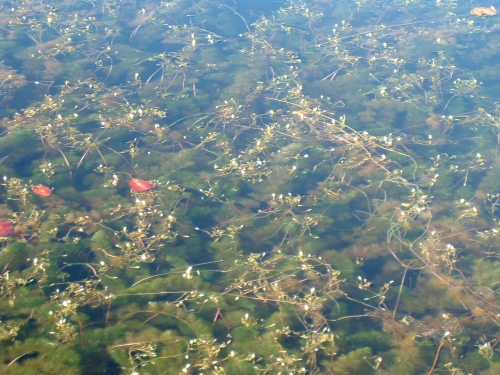Prepare your water garden for winter responsibly – Part II
Do not release! State law prohibits and restricts possession of exotic aquatic species, including popular water garden and aquarium plants and animals.
 Does your landscape contain a water garden? Do you maintain an aquarium? More than 13 million homes in the United States have water gardens or aquaria, which generates more than $1 billion in sales in our economy. However, non-native plants and animals can be very difficult to control once they become established in the environment, diminishing recreational opportunities, impacting native species and costing billions of dollars to control. According to the national Habitattitude campaign, the cost of trying to control these aquatic invasive species in the U.S. is more than $100 billion per year, approximately $1,100 per household.
Does your landscape contain a water garden? Do you maintain an aquarium? More than 13 million homes in the United States have water gardens or aquaria, which generates more than $1 billion in sales in our economy. However, non-native plants and animals can be very difficult to control once they become established in the environment, diminishing recreational opportunities, impacting native species and costing billions of dollars to control. According to the national Habitattitude campaign, the cost of trying to control these aquatic invasive species in the U.S. is more than $100 billion per year, approximately $1,100 per household.
Habitattitude encourages enjoyment of your water features and protection of Michigan’s magnificent waterways by offering responsible solutions to the disposal of dead, dying or unwanted aquatic plants and animals. If you are a successful water gardener, you know that plants can grow so successfully that they take over your pond. When autumn arrives, freezing temperatures may turn water garden plants unsightly. Do not release these plants and animals into the environment, where they may become aquatic invasive species (AIS).
To prevent the spread of AIS, Habitattitude provides responsible alternatives including:
- Contacting the local retailer where you purchased the plant or animal to inquire about proper handling advice or for possible returns
- Trade your species with another pond owner, water gardener or aquarium owner
- Donate these species to a local aquarium, school or aquatic business
- Seal plants in plastic bags and place in the trash
- Contact a veterinarian for guidance on humane disposal of fish, frogs, snails, etc.
Habitattitude also offers tips for thoughtful planning of your water feature to avoid stress, heartache and the spread of AIS. Before purchasing non-native plants and animals, know which aquatic species are prohibited and restricted according to Part 413 of Michigan’s Natural Resources and Environmental Protection Act 451 of 1994.
It is illegal to be in possession of, sell, offer to sell or introduce into the environment prohibited plants and animals, and hefty fines may be incurred. Michigan’s prohibited aquatic plant list includes popular water garden and aquaria plants such as European frogbit, Fanwort, Parrot’s feather, Yellow floating heart and others, along with many fish and snails.
Read Part I of this series, Prepare your water garden for winter responsibly - Part I.



 Print
Print Email
Email




